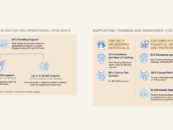In Vietnam, COVID-19 has driven a sharp upturn in demand for tech infrastructure and digital capabilities as banks accelerate their digital transformation, experts said during a panel discussion.
During a webinar hosted by Finastra, experts from the industry shed some light on the state of digital banking in Vietnam’s thriving internet economy.

Shweta Jain
“COVID-19 has accelerated the decision-making within Vietnam’s state-banks to go digital and full digital, so what would have been a 15-month or two-year period [in digital adoption] is now more looking like six to nine months,”
Shweta Jain, director of cloud and digital, retail and challenger banks at Finastra, said during the panel discussion.

Thang Phung
“Banks want to quickly move their businesses and transactions to digital. More and more of the state-banks, the larger banks in Vietnam, have understood how quickly they needed to become digital. So for us, tech providers, it’s a big boom.”
Thang Phung, sales director for the public sector and enterprises at Microsoft Vietnam, said that it’s not just the banking sector but many other industries as well as that are embracing technology at a remarkably rapid pace. Across the region, adoption of Microsoft cloud services has been the highest in Vietnam compared to other Southeast Asian countries, he said.
Digital payments get a boost

Anthony Thomas
The COVID-19 pandemic and social distancing measures put in place to limit the spread of the virus have forced Vietnamese people to adopt cashless payments and digital services.
Anthony Thomas, chairman of MoMo, a leading e-wallet in Vietnam, said the platform has witnessed a surge in peer-to-peer (P2P) transfers, mobile top up transactions, digital bill payments and online payments in general during the pandemic, while other areas including online travel booking contracted.
With hopes to capitalize on the shift to digital channels, MoMo has ramped up its digital capabilities, putting a lot of effort to deliver a superior user experience and a smooth onboarding process for both end-users and merchants. The startup is currently rolling out a new “super app platform” to allow third-parties to integrate with MoMo, Thomas said.
Fintech poised for primetime
Although fintech adoption in Vietnam remains low when compared to APAC counterparts like Singapore, the size of the market and the government’s effort to boost the digital economy make it “a great place to be working right now with many opportunities moving forward,” Claude Spiese, senior advisor of digitech innovation at Grant Thornton Vietnam, and founder of digital banking platform Timo, said during the webinar.

Claude Spiese
“Vietnam has done a great job in infrastructure … and is actually ahead of some of its neighbors,”
he said.
“I think it’s just in the financial services area which is traditionally dominated by state-owned companies, but which is now becoming more and more commercial-oriented. It will catch up and probably surpass some of its neighbors quickly.”
For Shweta, Vietnam’s large population of underbanked and high mobile penetration makes it a fertile ground of fintech and digital banking.
“The banking penetration is about 40% and credit card is really low compared to other countries in Asia Pacific (APAC). It is still a very cash-based economy,” Jain said.
“We see a big potential and there’s a huge transformation that’s going to happen in the banking industry in Vietnam. We are talking to a lot of banks and we are seeing that boom coming. I think the potential is much larger in Vietnam than other countries in APAC.”
Featured image: Pexels







